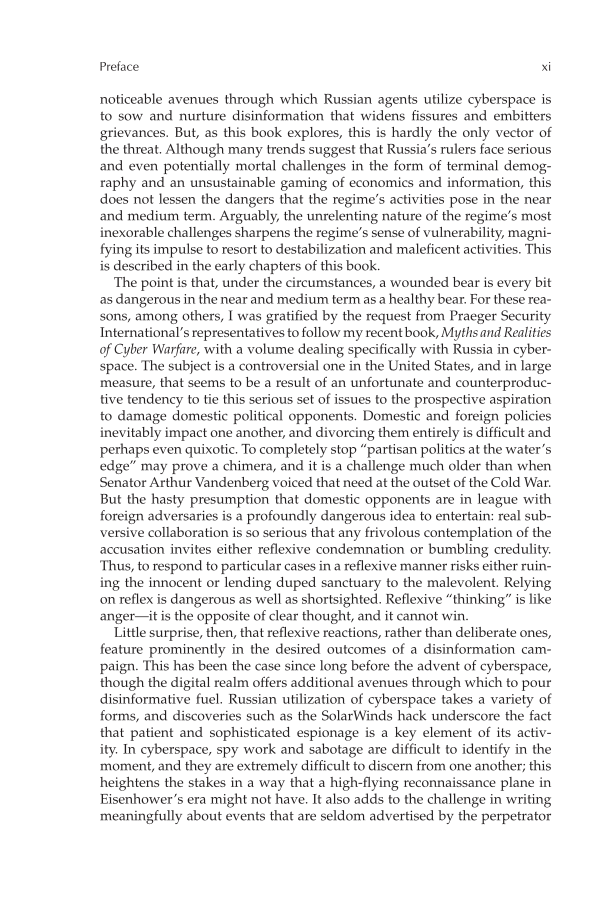Preface xi noticeable avenues through which Russian agents utilize cyberspace is to sow and nurture disinformation that widens fissures and embitters grievances. But, as this book explores, this is hardly the only vector of the threat. Although many trends suggest that Russia’s rulers face serious and even potentially mortal challenges in the form of terminal demog- raphy and an unsustainable gaming of economics and information, this does not lessen the dangers that the regime’s activities pose in the near and medium term. Arguably, the unrelenting nature of the regime’s most inexorable challenges sharpens the regime’s sense of vulnerability, magni- fying its impulse to resort to destabilization and maleficent activities. This is described in the early chapters of this book. The point is that, under the circumstances, a wounded bear is every bit as dangerous in the near and medium term as a healthy bear. For these rea- sons, among others, I was gratified by the request from Praeger Security International’s representatives to follow my recent book, Myths and Realities of Cyber Warfare, with a volume dealing specifically with Russia in cyber- space. The subject is a controversial one in the United States, and in large measure, that seems to be a result of an unfortunate and counterproduc- tive tendency to tie this serious set of issues to the prospective aspiration to damage domestic political opponents. Domestic and foreign policies inevitably impact one another, and divorcing them entirely is difficult and perhaps even quixotic. To completely stop “partisan politics at the water’s edge” may prove a chimera, and it is a challenge much older than when Senator Arthur Vandenberg voiced that need at the outset of the Cold War. But the hasty presumption that domestic opponents are in league with foreign adversaries is a profoundly dangerous idea to entertain: real sub- versive collaboration is so serious that any frivolous contemplation of the accusation invites either reflexive condemnation or bumbling credulity. Thus, to respond to particular cases in a reflexive manner risks either ruin- ing the innocent or lending duped sanctuary to the malevolent. Relying on reflex is dangerous as well as shortsighted. Reflexive “thinking” is like anger—it is the opposite of clear thought, and it cannot win. Little surprise, then, that reflexive reactions, rather than deliberate ones, feature prominently in the desired outcomes of a disinformation cam- paign. This has been the case since long before the advent of cyberspace, though the digital realm offers additional avenues through which to pour disinformative fuel. Russian utilization of cyberspace takes a variety of forms, and discoveries such as the SolarWinds hack underscore the fact that patient and sophisticated espionage is a key element of its activ- ity. In cyberspace, spy work and sabotage are difficult to identify in the moment, and they are extremely difficult to discern from one another this heightens the stakes in a way that a high-flying reconnaissance plane in Eisenhower’s era might not have. It also adds to the challenge in writing meaningfully about events that are seldom advertised by the perpetrator
Document Details My Account Print multiple pages
Print
You have printed 0 times in the last 24 hours.
Your print count will reset on at .
You may print 0 more time(s) before then.
You may print a maximum of 0 pages at a time.




























































































































































































































































































